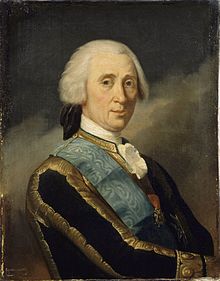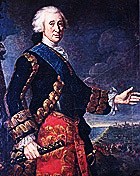Emmanuel of Croÿ
Emmanuel von Croÿ , also Emanuel von Croy , (born June 23, 1718 in Condé-sur-l'Escaut , Département Nord , France ; † March 30, 1784 in Paris ) was the 7th Duke of Croÿ , Prince of Solre , Prince von Mœurs , prince of the Holy Roman Empire and French military leader of the 18th century.
Life
Emmanuel was the only son of Philippe-Alexandre-Emmanuel de Croÿ (1676 to 1723), Prince of Solre etc. and Marie-Marguerite-Louise (1681 to 1768), Countess of Millendonk. He was by birth Prince of the Holy Roman Empire. At the age of 18 he began his service with the Gray Musketeers in 1736 and from 1738 commanded the Régiment Royal-Roussillon cavalerie . He made his first campaign in the War of the Austrian Succession (1740 to 1748) with the French army gathered in Westphalia . In 1742 he was involved with his regiment in the siege of Prague and then took part in the election of the Wittelsbacher Karl VII and the subsequent coronation of the emperor in Frankfurt am Main . Later that year he fought with his troops in the battle of Dettingen am Untermain, in which the French army was defeated.
In the following years, Emmanuel was stationed in Flanders from 1744 until the siege of Maastricht and was promoted to Brigadier des armées du roi in 1745 and after the siege of Maastricht to Maréchal de camp .
In 1757, as deputy of the absent Duke of Chaulnes, he was commissioned to repair the fortifications on the coasts of Picardy , Boulonnais and Calaisis in the far north of France. The coastal fort Fort de Croÿ or Tour de Croÿ on the beach of Wimereux , built from 1757 onwards, bears his name.
In the same year, Emmanuel de Croÿ was sent to Arras to look after the unsuccessful assassination attempt on King Louis XV. to investigate the background of the crime by Robert François Damiens in January of that year . His reports served as the source for the collection of Pièces originales du procès fait a Robert-François Damiens , which was published by the publisher Simon a few weeks after the proceedings were concluded.
In 1759, de Croÿ became Knight of the Order of the Holy Spirit and Lieutenant General Des Armées du roi and took part in the French campaigns of the Seven Years' War in Germany in 1760 and 1761 . On July 13, 1783, he was appointed Marshal of France .
After his death in Paris on March 30, 1784, part of his property was used in accordance with the provisions of his will for the reconstruction of the port of Dunkirk and the fortifications of Calais . His successor as the 8th Duke of Croÿ was Anne Emmanuel Duke of Croÿ (1743-1803).
He is still significant for posterity through his diaries, a total of 41 handwritten volumes that modern historians use to reconstruct the conditions at that time.
Works
-
Mémoires de ma vie
- German translated to French manuscript and annotated by Elisabeth Hergeth: Memories of my life: A journey through the west of the Holy Roman Empire. First edition of the diary from 1741/42; Agenda-Verlag, Münster 1999 ISBN 3-89688-037-3 .
- It has never been more wonderful to live. The secret diary of the Duke of Croÿ, edited and translated by Hans Pleschinski , Verlag CH Beck, Munich 2011, ISBN 978-3-406-62170-3 . (see below)
- Mémoires sur le passage par le Nord , 1782
literature
- Hans Pleschinski (translator and editor): It has never been more wonderful to live . The secret diary of the Duke of Croÿ, 1718–1784 , Verlag CH Beck, Munich 2011 ISBN 978-3-406-62170-3
Web links
- DHI Paris project for indexing and digitizing the estate
- The "secret" diaries of the Duke of Croÿ online
- The Fort de Croÿ at histopale.net
- Wolfgang Burgdorf: Sorry, but mostly I'm the only king here! Duke von Croÿ: It has never been more wonderful to live. Frankfurter Allgemeine , August 12, 2011, accessed January 4, 2014 .
Individual evidence
- ↑ Hans Pleschinski (translator and editor): It has never been more wonderful to live. The Duke of Croy's Secret Diary, 1718–1784 , p. 407
- ↑ Paris Historical Studies, Vol. 61, Burgundy and the Empire: p. 37 II. The Lower Rhine
| personal data | |
|---|---|
| SURNAME | Croÿ, Emmanuel von |
| ALTERNATIVE NAMES | Croÿ, Anne Emmanuel Ferdinand François Duke of |
| BRIEF DESCRIPTION | French military |
| DATE OF BIRTH | June 23, 1718 |
| PLACE OF BIRTH | Condé-sur-l'Escaut , Nord department , France |
| DATE OF DEATH | March 30, 1784 |
| Place of death | Paris |

